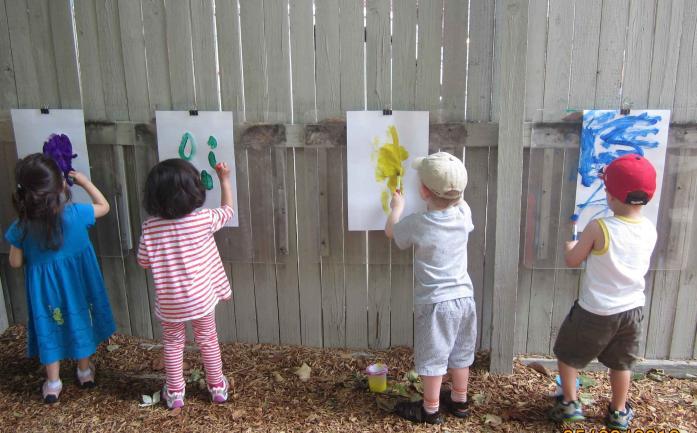About Us
Mission
Hoya Kids Learning Center (HKLC) was established to meet the needs of young children (18 months through 5 years of age) of University faculty, staff, and students, and to help Georgetown University parents better balance work and family responsibilities. The Learning Center is a key component of the University’s commitment to weave family needs into the fabric of the University community and its educational mission.

Through access to excellent child care, the University integrates its educational and scholarly missions, as well as the program and activities of the Center, as appropriate. The Center provides an atmosphere in which children can thrive as part of the Georgetown family.
The Center provides the highest quality child care possible and ensure an optimal environment for each child.
Philosophy
Following numerous surveys, discussions, and proposals conducted by a range of experts in the mid-1990s, GU president Leo J. O’Donovan, S.J. responded to the persuasive, sound, and consistent consensus of the University community on the need for an on-campus child care center. His intent was that the Center would be a means of fulfilling the unique responsibility of a Catholic and Jesuit institution to promote a strong family with an appropriate balance between work life and home life. Fr. O’Donovan identified Poulton Hall as the location for the facility and appropriated resources to launch the center. HKLC opened in the fall of 1997, with the capacity to provide the highest quality of care and learning to 58 children, ages 18 months to 5 years.
Hoya Kids Learning Center is dedicated to providing a sound early childhood program for children ages 1½ through 5 years of age that meets their social, emotional, physical and intellectual needs in a safe, homelike and loving environment. The unique characteristics of each individual child are valued at our Center. Each child’s interests and developmental stages are nurtured by our well-trained and talented team of early childhood professionals. At Hoya Kids Learning Center, we enjoy and appreciate children – their diversity, their challenges, their successes. Our Center is a place where all children are respected and loved.
We believe childhood should be a time of great joy, love and exploration. Based on our teachers’ knowledge, each child’s particular needs and what is meaningful for each child, curriculum emerges from the combination of teacher direction and children’s interest. Our early childhood professionals plan and prepare a program that is developmentally appropriate. In a developmentally appropriate program, hands-on experiences and age-appropriate play, activities and materials provide the foundation for learning and early literacy. Unlike formal instruction that focuses exclusively on academic skills, our play-oriented activities offer choices to children in a learning environment that supports and fosters their freedom of expression, growing independence, and positive self-esteem.
Our philosophy is based on flexibility and choice for children. The Center respects and accommodates the individual developmental levels of the child; we do not expect children to mold themselves to fit a prescribed plan of development. Discipline is approached in a positive manner with the goal of helping children learn self-control and problem-solving strategies.
Excellent communication is a top priority at Hoya Kids Learning Center. With daily communication through conversation and written notes, the staff and parents form a partnership to help each child’s day run smoothly. Parent get-togethers and workshops are also sponsored by the Parent Advisory Council and the Center. Parents are encouraged to volunteer in the classrooms and are always welcome at Hoya Kids Learning Center.
Hoya Kids Learning Center welcomes families without regard to age, color, disability, family responsibilities, familial status, gender identity or expression, genetic information, marital status, national origin, personal appearance, political affiliation, race, religion, sex, sexual orientation, source of income, veteran’s status or any other factor prohibited by law.
